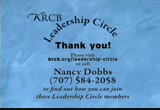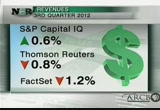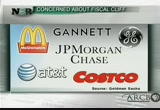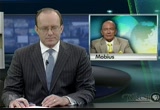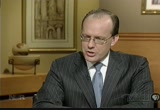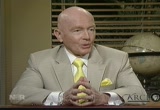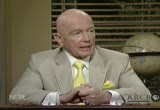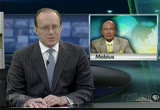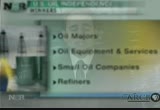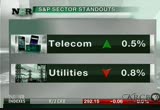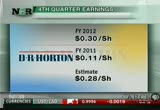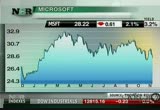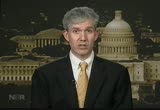tv Nightly Business Report PBS November 12, 2012 4:30pm-5:00pm PST
4:30 pm
>> this is n.b.r. >> susie: good evening everyone. i'm susie gharib. a dire warning from moody's to u.s. lawmakers: avert the fiscal cliff, or risk a credit downgrade. >> tom: i'm tom hudson. we're going global with legendary investor mark mobius, franklin templeton's top strategist on the state of emerging marketnow. >> susie: and picture this: the u.s. is just a few years away from being the world's top oil producer, and self-sufficient. we'll tell you who's making that prediction, and investment strategies for your portfolio.
4:31 pm
>> tom: that and more tonight on "n.b.r."! >> susie: the u.s.'s top-notch credit rating is at risk. that's the warning today from moody's investor's service. the ratings agency told u.s. lawmakers that when it comes to the fiscal cliff, the time to act is now, not next year. moody's said if action on averting the cliff is delayed until 2013, it might downgrade the stellar credit rating on u.s. debt. right now moody's has a negative outlook on the u.s. economy. worries about a fiscal freefall, kept wall street stocks in check: the dow and nasdaq fell a fraction, while the s&p was up a fraction. american businesses are not only concerned about the fiscal showdown in washington, but also about corporate earnings. nearly all of the s&p 500 firms have reported numbers, and profit growth is the slowest since the recession in 2009. and the majority of firms are also reporting disappointing revenues. here's erika miller with a look back at the quarter, and a look
4:32 pm
ahead. >> reporter: earnings season is drawing to a close. and for many firms it's good riddance. nearly all of the s&p 500 have reported quarterly numbers, and according to s&p capital i.q., profits are up a measly 2%. thomson reuters and factset crunch the numbers slightly differently, and believe profits are actually down. the bigger concern is revenue growth. s&p has the most optimistic analysis with a 0.6% gain. the other two firms see negative growth. firms face an almost universal problem: a slowing global economy. >> companies kind of put it in this context: the red flag is europe still. china falling there after, being kind of a yellow flag. >> reporter: that weak global demand is forcing many companies to cut prices, hurting profit margins. according to goldman sachs, bed bath and beyond, coach, marriott, fedex, southwest, and union pacific have all
4:33 pm
specifically talked about the difficulty preserving margins. a new, less obvious concern has also emerged this earnings season: >> we've been hearing a lot of concern about the fiscal cliff. not only are companies warning in their press releases, but even during the earnings calls, we're seeing that a lot more analysts are bringing it up. which shows that both wall st. and companies are concerned about the fiscal cliff. >> reporter: mcdonalds, gannett, general electric, j.p. morgan, costco and a.t.&t. are just a few companies that have warned that the fiscal cliff is complicating strategic planning. with all these challenges, firms are controlling what that can. >> companies now are mentioning very heavily their cost management programs going into 2013. they are hedging against the fiscal cliff with that. >> reporter: dow chemical, dupont, advanced micro devices, ford and kimberly clark have all announced layoffs, in an effort to cut costs. unfortunately the outlook for
4:34 pm
the 4th quarter is dimming fast. profits are expected to be up just 5%, with revenues remaining weak. that's bad news for investors, and workers alike. erika miller, "n.b.r.," new york. >> tom: $0.46 cents of every dollar s&p 500 companies make, comes from overseas. but with europe in trouble and china slowing down, companies and investors are looking to developing economies for new growth. we spoke with mark mobius, executive chairman of the templeton emerging markets group. mark, thank you for being here with us tonight. how do you describe the state of the global economy today? >> it's actually pretty good. i mean i know a lot of people look at the headlines and they say god, the world is coming to an end. but if you look at the leading indicators whether it's the pmi index for china and the u.s. or it's the oecd index you will see those indices are still
4:35 pm
high. they're not where they were at the end of 508ee, beginning of '09. so if that sense looking forward we're in pretty good shape. now of course if the so-called fiscal cliff is with us and we go over that, then as you know the budget bureau is predicting minus 4%. >> a recession for the united states. >> a real recession. unemployment going up and so forth and so on. but i think at the end of the day compromises will be reached. >> what about the emerging markets. we've seen some of the second markets begin to slow down or see the growth rates begin to taper off. are you experiencing that really across-the-board? >> yeah, pretty much with china coming down to maybe six, 7%. as you know this were at double digits. india is still about 6. and there are four or five countries that are well over five but they would have
4:36 pm
been, if we hadn't had all these problems they probably would have been much higher. >> uh-huh. >> but it's not like going to minus or at least even going to low single digits. >> it is the deacceleration that longer-term investors will point to as a worrisome trend. do you agree with that? >> of course. we have to watch it very, very carefully but at the end of the day if you look at the average for emerging markets, the average growth rate is 5%. >> uh-huh. >> so that's five times more than what the developments are doing. so when people ask me do you think we'll have a hard or soft landing in china they are-- 5, 6, 7% growth is very, very fast growth. >> are these economies developing themselves? so in other words, are they becoming less and less dependent on trade with the big economies like the united states and europe and more internally developed. >> that is really interesting because if you look at the numbers, the percent of their exports going to the eu and to the u.s. is
4:37 pm
going down. over the last ten years you have seen a steady decline in the percent of their total expert-- exports. but the actual dollar amount going up. so what's happening is that they are becoming less and less dependent upon the u.s. and europe and trading more monk themselves. and at the same time world trade is expanding. and that goes for the eu and the u.s. they are exporting more and more. >> give us a ne of an economy that you got your eye on for long-term investors. >> if we look at thailand i would say that would be one example of one of the smaller markets. of course the bricks, brazil, russia, india, china are still very much in our radar scope but if you look at some of the medium and smaller sized companies and countries you will see companies in thailand and thailand as a country very interesting. >> a lot of western technology firms build for instance disk drives in thailand.
4:38 pm
when thai experienced severe flooding those western companies got hit. what is attractive about thailand for long-term investors? >> it's mainly political to begin with. as you know they went through a lot of political turmoil. you had the red shirts, the yellow shirts, fighting on the streets of bangkok and so forth but they have a fufl foundation for political stability which is very good. and also they have a very diversified economy. >> we'll continue talking with mark mobius tomorrow, china's communist party selects a new set of leaders this week. we will talk about how this change in power could impact china's economic relationship with america, and american investors. >> reporter: i'm sylvia hall in washington- still ahead, u.s. borrowers owe more than $1 trillion in student loan debt. so could helping them pay it down be a $1 trillion industry? i'll introduce you to some entrepreneurs who think so. >> susie: besides the fiscal cliff, investors and traders on wall street were talking about some merger news today. leucadia national is buying
4:39 pm
jefferies group. it already owns 28% of the investment firm. the $3.6 billion deal, could help jeffees sh to the lucrative mergers advisory business. leucadia is a conglomerate with a wide range of businesses from beef processing to timber. also today, sherwin williams is buying consorcio comex, it's a mexican coatings business. the price: $2.3 billion. >> susie: the united states will be the top oil producer in the world by the year 2020, surpassing saudi arabia, and
4:40 pm
russia. that's the bold call today from the international energy agency. fueling that energy renaissance: a boost in oil and shale gas because of new technologies like fracking. the group also expects the u.s. wille a neexport by 2030, meaning we'll sell more oil than we bring in. right now the u.s. imports 20% of its energy needs. >> susie: so our word on the street tonight is "oil". joining us, gregg greenberg, reporter at the street.com. hey, gregg, i know you have been talking to a lot of oil experts today. it's kind of hard to imagine the u.s. after all these years being energy independent. what were they telling new what did you hear? look, scsi, the trend is certainly favorable. it's nice to hear we are producing more energy here in america and much greater than the reverse but i have to take reports like this with a grigg grain of salt. we have been hearing about
4:41 pm
peak energy for a long time, hearing about saudi arabia's reserves for a long time and you have to take it with a haley dose of skepticism, good news then again you have to be a little bit keptic. >> susie: all right, but if you do believe it's going to happen you have actually identified some companies and industry sectors that will be winners and losers if there is cerinlyoes happen. let's look at the list. go down your list, you start out saying that the oil majors will be winners here. so i guess are you talking about companies like exxon mobile, right? >> well, it's great for the oil majors like exxon mobile, chevron, conoco philips because they can find oil at home as opposed to going to dangerous places like nigeria or going deep not atlantic or the pas civic in the very rough north seas. they also don't have to deal with difficult actors, political actors like vladimir putin or morales who might national ice their oil resource. so it's easier for them. >> susie: all right, now you also say oil field equipment
4:42 pm
company and services would also do well. what kind of companies are you thinking of here? >> well, it's great for companies like baker hughes or schlumberger because if this is indeed a gold rush for energy companies, well they're selling the shovels. companies like halliburton as well will be selling oil rigs and equipment right here in the u.s.a.. >> susie: real bonanza for them. and you say it could also be good for small companies, mall oil comnies as well as refiners. tell us your thinking? >> well, small oil companies get bought out by big oil companies in places leak the marceleste shale are you seeing land prices rise in these places so if you are a small oil company or natural gatt company, buy land, buy some rigs, maybe get bought out by a big player. >> susie: we have less than a minute. let's go over the losers list. you mentioned there could be downside to fracking.
4:43 pm
you also tal about alternative energy companies could suffer. and defense contractors, you can give us a quick answer on that? >> well, it's difficult. when oil prices go up it's good for nuclear and solar and clean energy players. but when they go down which would happen if you get a lot more production in the u.s. it's bad for those players because people tend to go back to oil and using oil. as for the defense contractors, we're to the going to have to spend some of defending the middle east because we will not need those resources so much because we have it at home. >> y ga use lot of interesting analysis on this. thanks a lot, gregg. and we've been speaking with gregg of the street.come. you can find gregg's companion article on our web site nbr.com.
4:44 pm
>> susie: a server glitch here at the big board today, impacting trades in over 200 stocks. shortly after trading got underway this morning, the n.y.s.e. said it detected a problem with its new matching engine, that made it difficult to match buy and sell orders or publish prices on 216 different stocks. so the exchange halted trading in those stocks, and routed orders to other exchanges, for processing. the big board says it expects normal trading to resume tomorrow. speak of normal, there is nothing normal about what has been going be here for the last couple of day, tom, not only this glitch but a lot of worries about the fiscal cliff, you know, worries about the, what going to happen with easternings going forward and the market is so it's tough going last couple of
4:45 pm
days. >> tom: it s although a lackluster day today, veteran's day being observed really held trading volume down for monday, a quiet beginning to the week. let's get everybody updated with our market focus. lack lust cert best description for the session with the major indices barel regiering mh kang at all by the closing bell. the s&p 500 had a very narrow trading range of only seven points from its worst level of the day, around noon eastern, to its highest, about an hour later. by the closing bell, it had gained just a fraction. trading volume was light as veterans day was observed. just 291 million shares traded on the big board. under 1.4 moved on the nasdaq. the telecommunications sector had the best gain of the day, up 0.5%. utilities continue seeing selling pressure with the sector down 0.8%. utility stocks have come under increasing pressure. some electricity companies have reported disappointing quarters, but the industry is among the battle-grounds for the fiscal cliff. the utilities sector exchange traded fund has fallen off its own cliff this month. with today's 0.8% fall, the fund is down 6.7% since halloween. utility stocks tend to pay
4:46 pm
higher dividends, which attracted investors earlier in the year. but among the taxes scheduled to increase next year are taxes on dividends. another winning sector this year running into seller, home builders. the industry has rebuilt profits and growing sales thanks to record low interest rates and low inventory of homes for sales. d.r. horton is the largest home builder in the u.s., reporting its most profitablyear since the housing bubble of 2006. fourth quarter earnings were two cents better than estimates, and almost triple from a year ago. as a sign of future sales, its order backlog of homes under contract was up 49% compared to last year. but none of that satisfied traders today. shares fell 5.8%. volume almost tripled. one area of concern for analysts was the lack of profit margin improvement even though sales are increasing. that brought up some worries about rising costs. a smaller homebuilder, beazer, saw an even more negative reaction to its quarterly results. beazer sales fell 17.2% as it continues to lose money, more money than feared, sending the stock lower.
4:47 pm
microsoft newest video game is its biggest launch ever, but the company isn't so boastful about early sales of its surface tablet computer. microsoft said the initial sales of surface, "are starting modestly." the company pointed out its only for sale online and in a select group of stores in the u.s. but the company's video game "halo 4" is on track to bring in $300 million in its first week of global sales. the stock didn't get a boost from the strong video game sales, shares fell 2.1%. volumeas heavier than usual despite the lighter trading overall on wall street. three of the five most actively traded exchange traded products were higher, led by the 0.4% gain in the emerging markets fund. and that's tonight's "market focus."
4:48 pm
>> susie: more than five million people are behind on their student loan payments so says the new york federal reserve. but as bad as these numbers may seem, they're adding up to opportunity for some entrepreneurs. sylvia hall reports. >> reporter: there's no doubt college holds the key to the future for those who attend. but for many people, rising student debt makes that future a lot more complicated. entrepreneurs like mike cagney are getting creative and turning the problem into opportunity. >> it's just a trillion dollar market, but a market that we consider broken, there's no government underwriting, there's huge defaults, there's lots of problems in the structure of the student loan system. >> reporter: his company, so-fi, takes a small, school-by-school approach to solving the problem. the company allows a university's alumni to invest in a student loan payment pool.
4:49 pm
that pool funds loans for new students, and loan refinancing for qualified graduates. the alumni investors get the returns on the loans, and the company takes a small cut in servicing and management fees. >> it was a really elegant application of social, where you get a pool of alumni who care about their school, they care about their students, they invest in a fund, the fund lends to students and in doing so you create an explicit social contract between those students and those alumni investors. >> reporter: so-fi started at stanford and has quickly expanded to top schools like yale, harvard and columbia. tuition.io is another business that's taking off. it's a free online portal that helps students track all of their loans. borrowers can see their total debt, paymenoptions for ch loan, and total interest. founder brendon mcqueen built the site to solve his own problems. now, he hopes to partner with loan companies and servicers. >> if you're able to like, simplify that like payment process, a, the servicers will make more cash.
4:50 pm
and on the borrower's side, it will just be so much easier. so we're looking at like payment. >> reporter: in new york city, sabrina norrie and kelli space have an idea of their own, called zero bound. if students are struggling to pay debt in dollars, why not pay it through community service? they're still raising money, but once it's up and running, the company will help borrowers get donations in exchange for volunteer work. >> i thought, there's got to be a way we can get creative about this. and being involved in volunteer work, i thought, lets see if we can invest that education of students and alumni back into the community through volunteering. >> reporter: innovations like these have the support of the federal government, in a report last month, the consumer financial protection bureau said if they work, private businesses could play an important role in helping student borrowers pay down their debts. sylvia hall, "n.b.r.," washington. >> susie: for many people the holidays are typically a time to
4:51 pm
make charitable contributions. americans gave $200 billion to non-profits last year, and half of that came from the wealthiest americans. what influences their giving? ruben ramirez gets some answers. >> reporter: it's another typical school day at truman high school in the bronx. the cooking class is busy in the kitchen. the choir is rehearsing, the astronomy class is learning about stars. but it wasn't always like this. real estate developer charles bendit met truman high principal sana nasser a decade ago through a non-profit called pencil, it connects business people wanting to volunteer with schools in their communities. >> i was a small businessman that was just getting started, i was just beginning to realize that i might be successful. i didn't have what to give in terms of big dollars, so what i did do is i thought about how i could be most impactful. >> reporter: bendit serves as a mentor to principal nasser. together they developed the idea
4:52 pm
of specialized academies within the high school. bendit's biggest contribution, sharing his decades of business experience. >> it all started with learning how to be the c.e.o. of a company. and, how am i going to make sure my company, my school, is a successful school and is a competitive school and can attract the best of the best. a new study from bank of america and indiana university finds more people donating their time like bendit, volunteer hours are at an all time high. >> high net worth donors cite giving their money away as one of the top freedoms of wealth. the only way you can achieve those levels of fulfillment on a personal level is to be passionate about that which you are devoting your time, your talent, and certainly your dollars to. >> reporter: people are still donating money, giving away at least 10% of their household income each year according to the survey. and most of those expect to give at least the same amount next year. and, its not just about getting the tax deduction.
4:53 pm
>>e see thataxesre vry much a consideration in how folks might structure their giving and in the timing of their gift, but they are rarely part of the giving equation in terms of why people choose to give. >> reporter: here on capitol hill as congress grapples with how to step back from the fiscal cliff, two tax breaks for donors could be on the chopping block, charitable and estate tax deductions. luckily for the nations non- profits, at least half of the survey respondents say they would continue to give, even if the deductions were repealed. ruben ramirez, "n.b.r.," washington. >> tom: if this debate over the fiscal cliff sounds similar to you, like we've had this argument before between taxes, spending, and government debt; you're not alone. with tonight's commentary, here's matt slaughter, associate dean at dartmouth's tuck school of business. >> one of comedian bill murray's best roles was in groundhog day, in which his grumpy character stumbled through a series of gloomy-yet hysterical-days until
4:54 pm
he finally summoned the courage to act with dignity, with foresight, and with concern for the broader good. tme, america post-electn feels a lot like the middle of groundhog day. same president; same parties controlling congress; same leaders of congress likely to emerge. and, the same problem confronting the nation: yet another fiscal cliff. everyone knows the damage that falling over the fiscal cliff may bring: further policy gridlock, a sudden recession, and an unknowably bad shock to worldwide demand for u.s. debt. to avoid this fiscal damage, america today needs some people to step up and show the leaderip obillurray. to acknowledge that the country needs some mix of spending restraint and tax-revenue increases while both stimulating growth and protecting the vulnerable. and, to do all this with the necessary imagination. both parties have acknowledged
4:55 pm
the need for fundamental corporate-tax reform. who will lead the charge on cutting americas business taxes- but linked to reducing high-end tax expenditures to not further aggravate our deficits? here is hoping that in the coming days, americas fiscal life can imitate bill murray's art. 'm matt slaughter. >> tom: and finally tonight, wall street paused to honor the nation's veterans today. at the n.y.s.e., members of the u.s. armed services rang the opening bell, and the exchange observed two minutes of silence in commemoration of veteran's day. >> susie: and finally tonight, we'd like to thank a.p.t., american public television for awarding "n.b.r." its 2012 award of excellence. tom, it was a great honor to accept the award on behalf of "n.b.r." and our entire production team.
4:56 pm
that's "nightly business report" for monday, november 12. have a great evening everyone, and you too tom. >> tom: goodnight susie, we'll see you online at: www.nbr.com and back here tomorrow night. captioning sponsored by wpbt captioned by media access group at wgbh access.wgbh.org >> join us anytime at nbr.com. there, you'll find full episodes of the pro complete show transcripts and all the market stats. also follows us on our facebook page at bizrpt. and on twitter @bizrpt.
220 Views
IN COLLECTIONS
KRCB (PBS) Television Archive
Television Archive  Television Archive News Search Service
Television Archive News Search Service 
Uploaded by TV Archive on

 Live Music Archive
Live Music Archive Librivox Free Audio
Librivox Free Audio Metropolitan Museum
Metropolitan Museum Cleveland Museum of Art
Cleveland Museum of Art Internet Arcade
Internet Arcade Console Living Room
Console Living Room Books to Borrow
Books to Borrow Open Library
Open Library TV News
TV News Understanding 9/11
Understanding 9/11